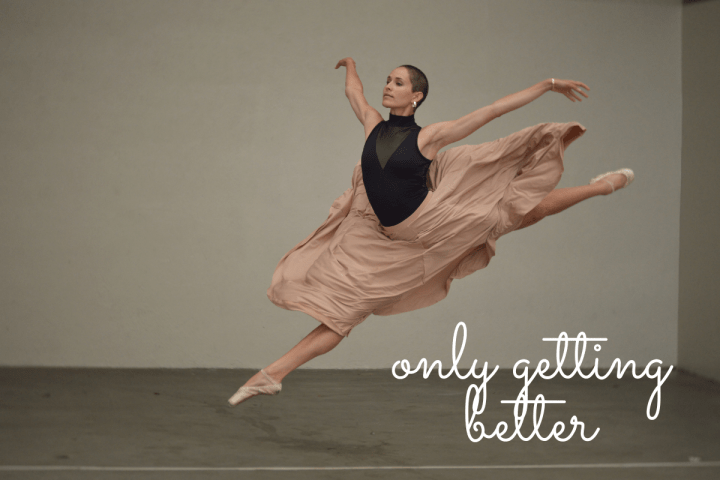
Being bad at any endeavor has become a taboo topic in our social media-obsessed world.
We only post our highlights, best angles, and most triumphant moments.
And thanks to the vast reach of social media, there is plenty of extreme talent across all possible realms.
In contrast, you won’t often see reels of failed attempts at anything unless it’s posted simply to make you laugh.
Based on social media scrolling, it would seem that there are only two options for any pursuit: excellence or a failure so comedically significant that it should be entered on the next episode of “America’s Funniest Home Videos.”
There is no middle ground.
But where does that leave you, the curious person who wants to learn new things?
Are there good reasons to pursue something, even if you’re terrible at it?
Today’s post explores why being bad at something is extraordinary and why your emotional wellbeing demands getting out of your comfort zone.
But before we dive into why you need to embrace beginner status, let’s bust a common myth that might be holding you back from trying something new.
This post may contain affiliate links. As affiliates of the Amazon associate program, Modacity, Dr. Josh Wright ProPractice, Musicnotes, Playground Sessions, and Piano Marvel, I may receive a commission at no extra cost if you purchase through a link. Please see my full disclosure for further information and privacy policy. I take no credit for the images appearing on this page. Certain photos are courtesy of Canva. Although I am a nurse practitioner, I am not YOUR medical provider. The information in this post is for informational purposes only. It does NOT replace individualized health information from a qualified medical professional. Please see a qualified medical professional for individualized assistance with your health and wellness.
The Talent Myth

Everyone is born with a little bit of talent.
And talent can vary widely from person to person and across different activities.
Talent, or a perceived lack of it, holds countless people back from trying new things every day.
Thanks in part to social media, people believe they must already have a natural affinity before trying any new skill.
Although natural talents can give you a boost when you’re first learning a skill, they can only get you so far.
Hard work is what takes you from “talented” to “extraordinary.”
And in some cases, talent can even hold you back from reaching new heights.
Talent can make the learning process easier.
But it’s also true that “talent” is tough to tease out from “practice.”
In other words, what can seem like talent is actually hours upon hours of practice.
And even the best athletes, musicians, and artists must start somewhere.
New Beginnings
Everyone starts as a beginner.
No one kicks off a new endeavor as a master of the craft.
Even people the world considers prodigies have hours of methodical practice under their belts before their discovery as a prodigy.
Mozart, for example, was surrounded by music from an early age.
His father set up a rigorous musical education program for him beginning when he was a toddler.
Even the concept of being born with perfect pitch is now being debunked by research.
Studies have shown that exposure to certain types of music education at a very early age often results in the child eventually being able to name a specific note when played or sung (perfect pitch).
It bears repeating: EVERYONE starts as a beginner.
There are no exceptions.
When starting any new hobby, creative work, or sport, there is a period in which you will be awful at that thing.
The key is to keep pushing forward.
At this point, you might be asking yourself why you should put in hours of work only to feel like this new pursuit is a complete waste of time.
Although it may feel pointless, learning any new skill has incredible benefits for your brain health, emotional wellbeing, and, in some cases, social interactions.
Benefits of Being a Beginner

Do you remember being in elementary school and being asked to draw a picture?
Maybe it was of yourself, your house, or your family.
You may have had all these ideas about how you wanted it to look.
You thought about it, then put pen to paper, giving it your absolute best.
And how did it look when you were done?
I’m willing to bet that it looked terrible.
Your final drawing looked nothing like the thing you imagined.
But regardless of what it looked like, you brought it home to your parents.
And your mom gushed over your artistic endeavor like it was the best thing she had ever seen.
In fact, you brought home an endless supply of terrible drawings, and your parents couldn’t get enough of them.
No Expectations
Your parents loved your drawings because they came from you.
Also, they had zero expectations for how your artwork should look.
They were simply happy that you gave it a shot.
It’s the same for any new learning experience.
When you first start something, you will be bad at it.
It’s normal!
You’re not supposed to pick something up and immediately excel at it.
And that’s ok!
Embracing the beginner experience by letting go of unrealistic expectations is one of the best ways to drop your guard and dive headfirst into something new and exciting.
Knowing that the expectations couldn’t be lower is an incredibly freeing thought!
Build Resilience

Succeeding at anything in life requires that you push through hard stuff.
Regardless of what you pursue, there will be difficulty.
And when you encounter difficulty, you always have a choice.
You can certainly choose to give up when things get tough.
Sometimes, pushing through to the end result isn’t in your best interest.
But at other times, navigating a new challenge is exactly what you need.
Overcoming barriers builds resilience.
It gives you the kind of self-confidence that some people only dream about.
With every new triumph, you build your reserve of resilience, making the next challenge more attainable.
Resilience is what gets you through the hard times.
And what better way to work on resilience than by pursuing something new?
Stop Caring What Anyone Thinks
Did I mention that we live in a social media-obsessed world?
Sometimes, it feels as if the world runs on “likes” and “shares.”
But it really doesn’t.
Being a beginner means you don’t have to post anything on social media.
You can do your own thing regardless of what anyone else does or thinks.
You’re free to learn and grow on your own.
There’s no one to impress.
You decide who knows about your new endeavors.
And not everyone has to know about it.
You can shed external validation and start validating your own achievements.
What could be more empowering than that?
Other Reasons to Embrace the “Suck”
No one likes being a beginner.
But it’s hard to deny some of the benefits that come with beginner status.
There are no expectations.
You get to practice being more resilient, a skill applicable to all aspects of life.
And because you’re so bad at whatever you’ve started, you have the freedom to let go of the opinions of anyone else.
Here are a few more benefits to embracing the “suck.”
Your Brain Needs It
Using your brain in new and different ways expands your ability to think and process information.
Your brain loves streamlining.
But when you challenge it by trying something new and completely different, you build new pathways in your brain.
New pathways mean a new perspective.
It’s an opportunity to problem-solve from a completely different mindset.
And keeping your brain active as you age is one of the best ways to combat cognitive decline.
Fun

When was the last time you did something for the sole purpose of having fun?
It can be easy to get stuck in a rut of “to-do lists” and productivity.
Everything becomes a task that you have to cross off your list.
But that kind of mindset can be a fast track to burnout.
You need activities you enjoy, but that doesn’t necessarily serve a purpose other than fun.
Focusing on enjoying something rather than your ability to do it is one of the best ways to start living life rather than passively experiencing it.
Release Perfectionism
If you struggle with perfectionism, learning that it’s ok to be bad at something is one of the greatest gifts.
Although perfectionism might seem like a positive trait, it’s a toxic, self-defeating mindset in many cases.
Instead of seeing a world of possibilities, many perfectionists see giant walls at every turn.
These walls keep them from expanding their horizons due to a fear of subpar performances.
Perfectionists may procrastinate and become overly critical of their abilities, often leading to depression and anxiety.
But releasing oneself from any expectation is incredibly freeing!
In other words, having one activity you simply do for fun can set off a chain reaction of self-acceptance.
It takes mindful practice, but learning to focus on fun instead of skill can help you begin shedding the self-criticism keeping you from truly enjoying life.
It’s Your Turn
Hopefully, this post has inspired you to get out there and try something at which you’re absolutely horrible.
Try something completely different than you’ve ever tried in the past.
It’s a great way to start releasing your fear of failure and dive in!
And let me know what new and exciting hobby you’re trying in the comments below!
For more great inspiration, check out one of my previous posts:
- 7 Ways to Enjoy the Journey of Life: Simple Tips
- 25 Tips for How to Stay Focused When Practicing the Piano
- How to Tell When You’re Overwhelmed
- Best Keyboard Piano for Adult Beginners in 2023
- 5 Simple Tips to Help You Be More Productive
- How to Stay Motivated to Play Piano: Practice Tips
- The ONE Thing: A Case for Narrowing Your Focus
- The Best Ways to Learn Piano in 2023
- 5 Powerful Ways to Halt Limiting Beliefs in Their Tracks
- 3 Secrets to Reversing Your Perfectionist Tendencies








































